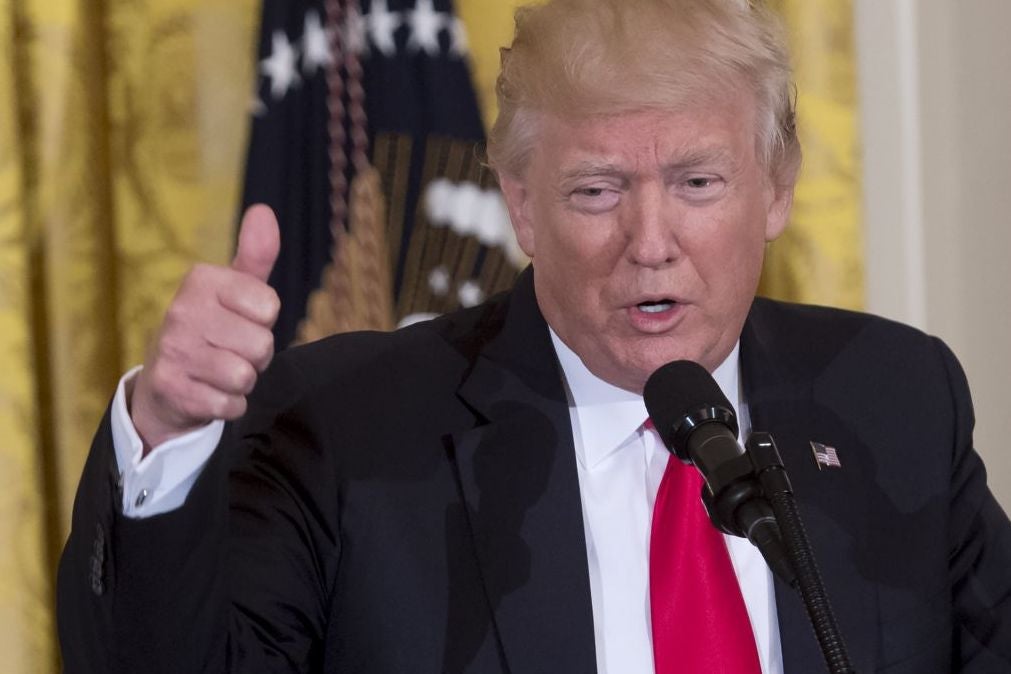Donald Trump’s laptop ban could lead to 'catastrophic' fire on flight, airline pilots say
Department for Homeland Security wants to extend ban to cover transatlantic flights to US

UK airline pilots have warned of the risk of a “catastrophic” on-board fire if a ban on laptops is introduced on transatlantic flights.
Most laptops, tablets and e-readers are powered by lithium batteries which, when faulty or short-circuited, can ignite.
Laurie Price, former Aviation Advisor to the Transport Select Committee and himself a private pilot, told The Independent: "We have had numerous incidents of devices with lithium batteries suddenly bursting into flames. If that is in the aircraft cabin, it can be dealt with. If in the aircraft hold, the fire-suppression systems are unlikely to be able to contain it and there is a lot of material to exacerbate such fires including other baggage, the aircraft structure, fuel and systems in an area which is inaccessible in flight.
"The consequences could be catastrophic."
The warning was echoed by the British Airline Pilots’ Association (BALPA), which believes the danger of a blaze spreading in the aircraft hold could be greater than the security risk posed by electronic devices in the cabin.
BALPA’s Flight Safety Specialist, Steve Landells, said: “There have been two crashes where lithium batteries have been cited in the accident reports.
“An incident in the cabin would be spotted earlier and this would enable the crew to react quickly before any fire becomes uncontainable."
The pilots’ warning comes as European and American officials prepare for a meeting to hammer out new security rules. The Trump administration was poised to extend its ban to all flights inbound to the US last week, until the European Commission objected.
In March the Department of Homeland Security (DHS) abruptly brought in a ban on laptops, tablets and e-readers on flights from eight Middle Eastern and North African nations to the US. The DHS cited intelligence reports that terrorist groups are “aggressively pursuing innovative methods“ to attack passenger planes, including “smuggling explosive devices in various consumer items”.
Anything bigger than a smartphone must travel as checked baggage in the hold of the plane.
The UK Government quickly brought in a ban that emulated the US prohibition, though with a different list of countries. On flights to Britain from Egypt, Turkey, Lebanon, Kuwait, Saudi Arabia and Jordan, passengers cannot take any large devices into the aircraft cabin. But none of the 27 other EU members has followed suit.
The European Aviation Safety Agency (EASA) has warned that electronic devices containing lithium batteries are considered to be dangerous goods. The air safety regulator insists: “They should preferably be carried in the passenger cabin.”
When this practice is banned, says EASA, airlines must check that devices are “completely switched off and effectively protected from accidental activation”. It insists laptops “should be dispersed in the cargo hold, avoiding consolidation in a single container”
Patrick Ky, EASA’s Executive Director, said: “We must take all precautions to make sure that mitigating one risk does not lead to another risk.”

The proposed extension of the ban has also angered US airlines. The present prohibition affects only non-American carriers, in particular the three big Gulf-based airlines: Emirates, Etihad and Qatar Airways. But an international ban would also affect American, Delta and United Airlines.
Delta has apologised for mistakenly posting a warning at Cincinnati airport that any electronic device bigger than a mobile phone would need to be checked in on the return journey to the US.
The error had echoes of the way that the original devices ban became public; the new rules were prematurely revealed by Royal Jordanian Airlines in a tweet.
Britain’s aviation industry is known to have serious concerns about an extension of the ban. Excluding laptops from aircraft cabins would deprive business travellers of their technological supports and the chance to work on board, potentially weakening demand among the premium passengers who bankroll transatlantic air travel.
Logistical issues at airports are also causing concern. A ban would necessitate additional security checks at the departure gate. The worst affected airport would be Heathrow, which has 24 daily flights to New York alone, and dozens more to other US destinations.
A spokesperson for the airport said: ”We are aware of media reports speculating on changes which may impact some passengers, but at this time, no changes have been announced by the authorities and there is no impact at Heathrow.“
Join our commenting forum
Join thought-provoking conversations, follow other Independent readers and see their replies
Comments